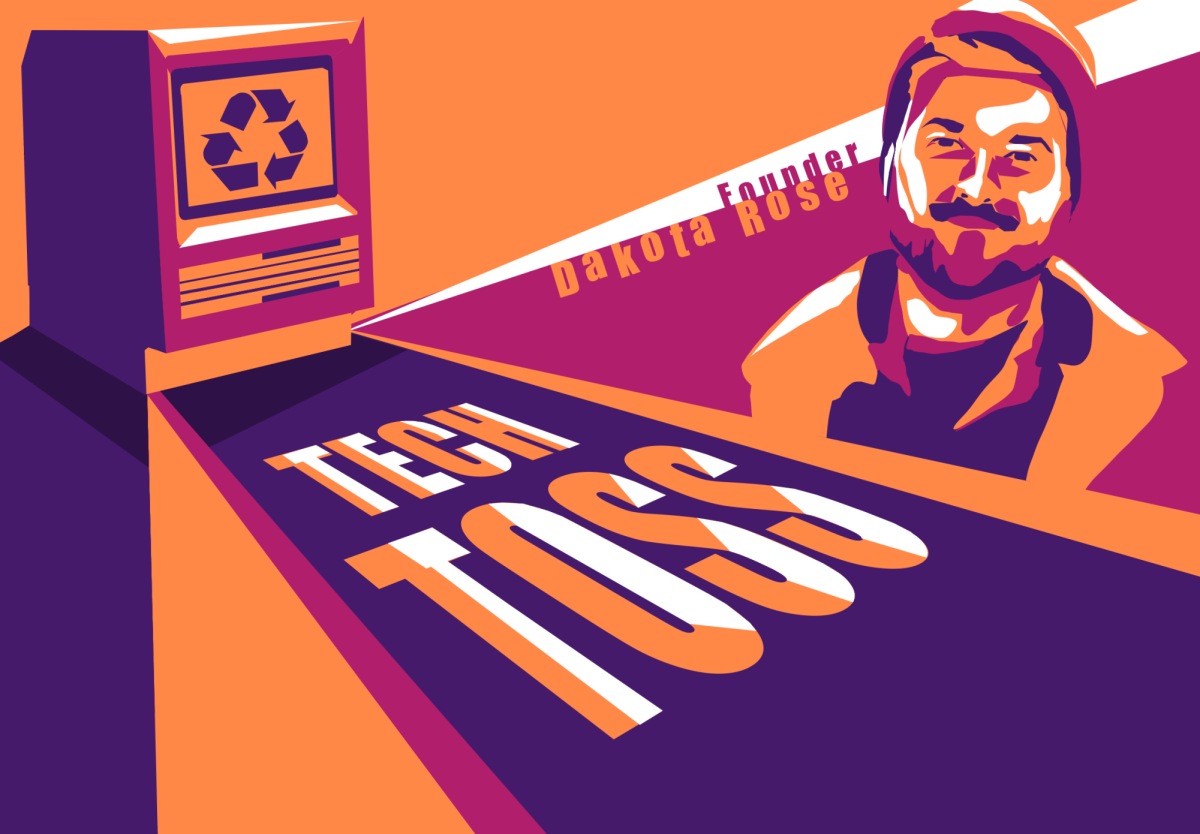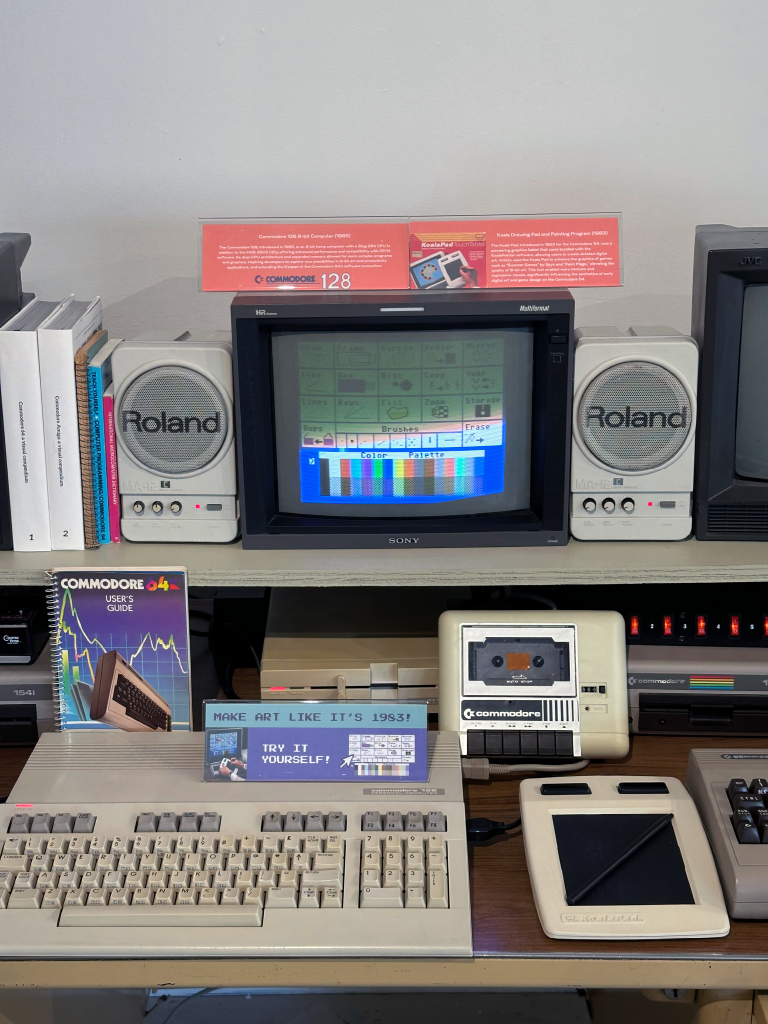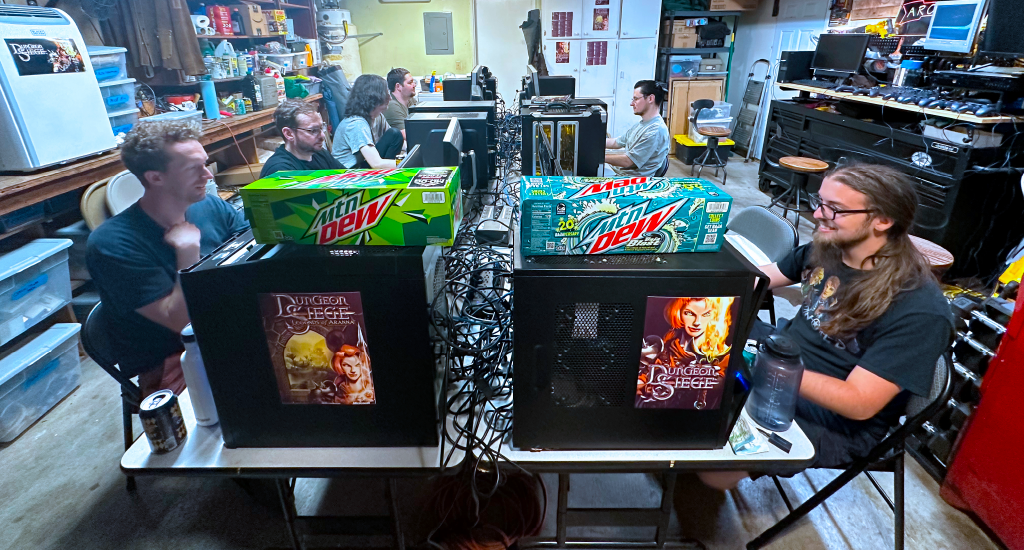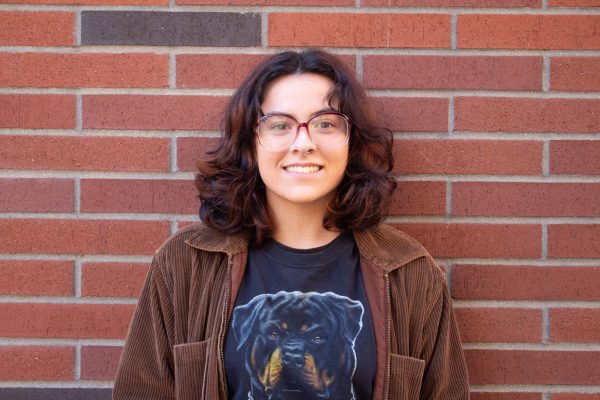The waste technology innovation produces isn’t all trash, according to non-profits like Tech Toss, an e-waste recycling facility in its early stages of becoming a hub of accessibility, education and community building through old technology.
Currently, Tech Toss is running out of founder Dakota Rose’s garage. They are able to take in computers, give tax write-offs for those donations and connect people with the technology they need.
“Just last week, we had a woman drop off some laptops, and we knew three Chico State students needed laptops,” Rose said. “We were able to pair those people together immediately.”
Tech Toss officially opened about a month ago and was recently recognized as a non-profit organization.
“What we’re aiming to do is to basically end [the] planned obsolescence of people retiring their MacBooks after two years,” he said. “We’re hopefully going to get that out of people’s mindsets and say, ‘Hey, you can still use that computer! You just need to bring it to TechToss and we’ll teach you how to.’”
Most don’t attempt to lengthen the lifespan of their tech, leading to electronic waste, or E-waste, which has become the world’s fastest-growing waste stream, according to the International Labor Organization.
Obsolete or damaged technology cannot go into landfills like normal waste can. In California, The Electronic Waste Recycling Act of 2003 and the Responsible Battery Recycling Act of 2022 both aim to prevent hazardous material from harming both the environment and waste streams.
Hazardous materials that popular technology is made with include:
- Cathode ray tube glass
- Plasma screens
- Organic light-emitting diode
- Liquid crystal displays
- Common in devices like TVs, laptops, monitors and tablets
Other devices with embedded batteries are also planned to be prohibited from harming the environment and the waste streams with the 2022 Act.
E-waste facilities like Tech Toss are able to properly store, reuse or dispose of retired technology. Tech Toss also intends to educate the public on how to make their devices last longer.
“It uses upcycled hardware from the E-waste portion of the business to teach and get people into career development for whatever they’re interested in,” Rose said.
Providing technology to those who need it is exactly what Rose aims to do. He encourages those who need either a laptop or desktop to reach out through Instragam or TechToss’s email.
“TechToss is my way of giving back to people who might have the dream that I had when I was younger, but hopefully, I can help them get to it a little bit faster so they can obtain the knowledge that they need and the tech that they need in a faster way,” he said. “And they don’t have to go into debt for it, you know?”
Although Tech Toss is new to the Chico area, Dakota Rose is not.
Rose was born and raised in Chico and has had a passion for filmmaking from an early age.
“I was part of the broadcast team at Emma Wilson Elementary,” he said. “At Chico Junior High School, under Andy Wahl’s direction, I did [a] student broadcast there; it’s called KCJ. Then, at Chico High, I did the Academy of Communications and Technology program under Ron Pope and Chris Persson, which got me really interested in all the facets of filmmaking.”
However, with his father being an ironworker and his mother running a foster care home, Rose says he came from a poor background. This seemed to clash with his dreams in film production, as training and equipment within that field can be inaccessible to lower-income people.
“If you know anything about filmmaking, it’s sort of a rich man’s game,” Rose said, “You’ve got to have some capital behind you and that was always a big struggle.”
Rose recalls Ron Pope, who ran Chico High School’s Academy of Communications and Technology — now known as Inspire — and Pat Furr, a former CEO of Computers for Classrooms, as people who helped get himself on the film track.
“I was like 14, 15 years old, she [Furr] would let me wander in the back of the warehouse and pick up parts for whatever I wanted to build for a computer,” Rose said. “I got my first Mac that way, which then I learned how to edit Final Cut.”
With his experience from high school, Rose went to Butte College for his associate of science degree in both radio, TV and film and multimedia studies.
Rose speaks highly of his time at Butte, recommending their courses for multimedia since they are a well-funded program with a variety of courses like drone operating programs, computer coding and game design. Rose also said a virtual reality headset course is coming up.
Since then, Rose has attended the University of California, Berkeley and, with a team of about 50 people, has been the finishing editor theatrical trailers for Disney, Pixar and Lucas Film since 2016. He has cut trailers and commercials for entertainment companies like Netflix, Disney Plus and Hulu Originals.
Other than marketing, he worked as assistant editor for Marvel’s stop motion comedy “M.O.D.O.K”
He got the inspiration for Tech Toss from working with Los Angeles film studios.
One studio Rose worked with — he wouldn’t say which — had policies that required older computers to be thrown out as a security precaution.
“This particular studio did not have a contract with an E-Waste facility,” he said. “So, they would throw away their equipment in the dumpster behind their work. Like, they would actually toss it.”
Rose happened to be friends with the head of IT, who tipped him off whenever more computers were dumped, and Rose would load them up in his car.
“That’s how TechToss started. [I] was basically redistributing those workstations, mostly for free to people who I knew who needed them,” Rose continued. “I still had a big community in Chico at the time, so anytime I’d visit, I could bring a carload full of computers and just kind of give them out. So, everyone in my family has a ridiculously high power workstation that, like, Pixar trailers were cut with, or Pixar commercials.”
After the COVID-19 pandemic, Rose was able to work remotely, leading to his move back to his hometown.
“I lived in Hollywood proper for several years, and it’s not my scene,” he said. “If you grew up in Chico and a rural community, you kind of miss the small-town vibe.”
TechToss is working in the same community that gave him the tools needed for the industry. Rose would like to provide similar resources for the next generation by working with Butte College and Chico State.
Rose hopes for a partnership between both colleges. He envisions a system where students can take classes through TechToss for college credit.
The workshops would use donated technology for courses like graphic design, computer science or film studies once a proper space is obtained. Classes would include micro board repair, component soldering and personal computer building.
“Once we do get a classroom space, we have a big fleet of high-end computers that will hopefully serve as the backbone,” he said. “If you wanted to come and learn how to edit on Premiere, or you want to get certified in DaVinci Resolve or Avid, you could come down to TechToss.”
Rose also hopes to get formal contracts lined up with production companies like Warner Brothers, Paramount Pictures, Disney and Hulu to help distribute their E-waste to college students in town.
Since being back in town, Tech Toss has lent out devices for events such as 1078 Gallerey’s 8-Bit August exhibit and has held events of its own.
A Local Area Network Party is when people get together to set up their computers in the same room and play video games. Although these types of parties reached peak popularity in the 90s, TechToss has been hosting their own.
“I used to host LANs back then, back when they were still sort of relevant,” Rose said. “I really enjoy in-person communication and gaming in that fashion — like social gaming where people are together and hanging out all night and playing their favorite game.”
Once Tech Toss reaches its goal of obtaining a physical office space, they are aiming to establish a space for community connection, open to anyone wanting to play video games.
Since coming back to Chico, Rose noticed besides the bar scene, there weren’t many social-gathering places for adults.
“I want TechToss to be more than just an E-waste place. I want it to be a communal hub for people to hang out,” Rose said.
For Chico State students, they will be able to experience a LAN Party on campus. The College of Communication and Education will host a Retro PC Gaming event as part of their Study Break Series on Thursday, Sept. 26. The event will take place from 4-6 p.m. in Tehama 111.
While Rose has grand aspirations for Tech Toss, it is still in its infancy.
“We’re still looking for grant funding and a physical location, which would involve having a warehouse for receiving large pallets of computers and then an office/lobby venue.”
Aside from the office space, Tech Toss needs more computer repair experts and event volunteers.
“Eventually, we’ll need people with extensive networking knowledge,” he said. “C certification, stuff that is far above me. I’m self-taught in the tech world, so everything I know is sort of just from me tinkering and playing around.”
Agencies that want to donate or know of people in need of technology are encouraged by Rose to contact Tech Toss, either through their Instagram or their email.
Nadia Hill can be reached at orionmanagingeditor@gmail.com.
To read the article in Spanish, go here.











Kathy Shaw // Sep 12, 2024 at 4:32 pm
Very informative, great for the school and community